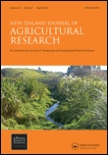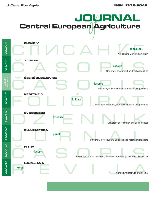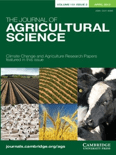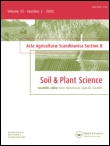
NEW ZEALAND JOURNAL OF AGRICULTURAL RESEARCH
Scope & Guideline
Cultivating Knowledge in Soil and Crop Management
Introduction
Aims and Scopes
- Sustainable Agriculture Practices:
The journal emphasizes research that promotes sustainable agricultural practices, including soil management, crop rotation, and integrated pest management, aimed at minimizing environmental impacts while maximizing productivity. - Animal Production and Health:
Research in this area focuses on improving livestock health, productivity, and welfare, with studies on feeding strategies, genetics, and management practices tailored to New Zealand's unique agricultural context. - Forage and Pasture Management:
The journal covers advancements in forage species, pasture management, and their economic viability, which are crucial for New Zealand's pastoral farming systems. - Environmental Impact Assessment:
Papers often explore the environmental implications of agricultural practices, addressing issues such as nitrogen leaching, greenhouse gas emissions, and soil health. - Innovative Agricultural Technologies:
The journal features research on the application of new technologies, such as precision agriculture, genetic modification, and biocontrol methods, aimed at enhancing agricultural efficiency. - Crop Science and Agronomy:
Research in crop science covers the development and management of various crops, focusing on yield improvement, pest resistance, and adaptation to climatic conditions.
Trending and Emerging
- Climate Resilience and Adaptation:
Research is increasingly oriented towards understanding how agricultural systems can adapt to climate change, including studies on drought-resistant crops and sustainable water management practices. - Precision Agriculture Technologies:
There is a growing interest in precision agriculture, with studies focusing on data-driven practices that optimize resource use and improve crop yields while minimizing environmental impact. - Nutrient Management and Efficiency:
Emerging research highlights innovative nutrient management strategies aimed at reducing leaching and improving nutrient use efficiency, reflecting a broader concern for environmental sustainability. - Alternative Protein Sources:
Research into alternative protein sources, such as insects and plant-based proteins, is gaining traction as a response to global food security challenges and dietary shifts. - Biodiversity in Agricultural Systems:
There is a notable increase in studies exploring the role of biodiversity in agricultural ecosystems, focusing on how diverse planting can enhance resilience and productivity. - Animal Welfare and Ethical Practices:
An increasing number of papers are addressing animal welfare issues, including the impacts of farming practices on livestock health and behavior, reflecting societal shifts towards ethical farming.
Declining or Waning
- Conventional Pesticide Use:
Research on conventional pesticide use is decreasing as there is a growing emphasis on integrated pest management and organic farming practices, which are seen as more sustainable alternatives. - Traditional Crop Breeding Methods:
There is a noticeable decline in studies focusing solely on traditional crop breeding methods, as more attention is being directed towards biotechnology and genetic modification techniques. - General Soil Fertility Studies:
While soil health remains a critical topic, general studies on soil fertility without a specific focus on innovative management practices or environmental impact are becoming less common. - Chemical Fertilizer Dependency:
Research centered on the use of chemical fertilizers without exploring sustainable alternatives or environmental consequences is waning, in line with a broader movement towards sustainable agriculture. - Livestock Production without Welfare Consideration:
There is a decreasing trend in studies that do not address animal welfare in livestock production, as ethical considerations gain prominence in agricultural research.
Similar Journals

Chilean Journal of Agricultural & Animal Sciences
Unlocking the potential of Chilean agriculture and animal studies.Chilean Journal of Agricultural & Animal Sciences, published by UNIV CONCEPCION, CAMPUS CHILLAN, serves as a pivotal platform for disseminating innovative research in the agricultural and biological sciences. With an ISSN of 0719-3882 and an E-ISSN of 0719-3890, this journal has established its significance in the academic community, particularly within the realm of agricultural studies in Chile and beyond. As it continues to evolve from 2014 through 2024, the journal is classified in the Q4 quartile for Agricultural and Biological Sciences and ranks 187th out of 221 journals in this category according to Scopus, placing it in the 15th percentile. While currently not an open-access journal, it aims to provide readers with insightful studies and developments that contribute to the understanding of agricultural practices and animal sciences. Researchers, professionals, and students will find invaluable resources here, fostering knowledge transfer and collaboration within this critical field.

Agrivita
Fostering collaboration in Southeast Asian agricultural research.Agrivita is a distinguished, open-access journal dedicated to advancing research and knowledge in the fields of Agronomy and Crop Science. Published by Brawijaya University, Faculty of Agriculture, this journal has been providing a platform for high-quality scholarly articles since 2010. Located in the vibrant country of Indonesia, Agrivita plays a vital role in the exchange of innovative agricultural research, particularly within the Southeast Asian context. As of 2023, it holds a respectable Q3 ranking in its category, showcasing its commitment to scholarly excellence and visibility. With an increasing impact on the academic community, and its current Scopus rank placing it in the 48th percentile, Agrivita stands as a crucial resource for researchers, professionals, and students eager to deepen their understanding of crop science and agronomy. The journal's scope encompasses cutting-edge research that addresses both fundamental and applied aspects of agriculture, ensuring it remains relevant to today's pressing agricultural challenges. Its open access model enhances global accessibility, fostering a collaborative environment where diverse opinions and findings can converge.

Revista Ciencia Agronomica
Empowering innovation in agronomy and beyond.Revista Ciencia Agronomica is a leading open access journal published by the Universidade Federal do Ceará, Departamento de Geociências, dedicated to advancing the field of agricultural sciences. Established in 2008, the journal has emerged as a significant platform for the dissemination of original research and innovative advancements in areas including agronomy, horticulture, and soil science, with a dedicated convergence of years extending to 2025. With an impactful presence in academic circles—ranking in Q3 for Agronomy and Crop Science and Soil Science and Q2 for Horticulture in 2023—this journal provides vital insights for researchers and practitioners alike. Although specific HIndex metrics are currently unavailable, the journal's Scopus rankings attest to its relevance, placing it in the 52nd, 44th, and 43rd percentiles across multiple pertinent categories. Since transitioning to an open access model in 2010, Revista Ciencia Agronomica has committed to maximizing the reach and impact of its published work, thereby ensuring valuable contributions to global agricultural knowledge.

Journal of Central European Agriculture
Empowering Agricultural Excellence Through Open Access ScholarshipThe Journal of Central European Agriculture, with ISSN 1332-9049 and E-ISSN 1332-9049, is an esteemed platform published by UNIV ZAGREB, FAC AGRICULTURE that caters to the dynamic fields of agronomy, crop science, and animal science. Since its establishment in 2000, this Open Access journal has played a crucial role in disseminating critical research findings while fostering collaboration among academics, researchers, and professionals within the agricultural community. The journal, which is based in the heart of Croatia, spans a rich history of scholarship, with its content available for free to readers and contributors alike. As reflected in its current standings, the journal has achieved a Quartile 3 ranking in Agronomy and Crop Science and Quartile 4 in Animal Science and Zoology for the year 2023, indicating its growing influence within these disciplines. With Scopus ranks placing it in the 32nd percentile among its peers, the Journal of Central European Agriculture is committed to advancing agricultural sciences not only in Central Europe but globally as it prepares for its converged years from 2007 through 2024. This journal serves as a vital resource for innovative research, practical applications, and a deeper understanding of agricultural challenges and solutions.

TROPICAL AGRICULTURE
Unveiling the complexities of Caribbean agriculture.Tropical Agriculture is a reputable journal dedicated to advancing knowledge and research in the fields of Agronomy and Development, with a particular emphasis on tropical farming practices and agricultural innovation. Published by the University of the West Indies, this journal serves as a crucial resource for researchers, professionals, and students engaged in the complexities of agriculture in the tropics. Established in 1979, it has witnessed significant contributions and continues to facilitate scholarly discussions through its quarterly publications. While the journal currently holds a Q4 ranking in both the Agronomy and Development categories, its commitment to fostering research excellence positions it as a pivotal platform for emerging studies and regional agricultural advancements. Although not an open-access publication, it provides critical insights and localized research that greatly benefit the agricultural community, particularly within the Caribbean context. Researchers and professionals in the field can rely on this journal for insightful content on tropical agricultural challenges and developments, enhancing knowledge dissemination and application across related disciplines.

Crop Forage & Turfgrass Management
Transforming agricultural landscapes with impactful insights.Crop Forage & Turfgrass Management, published by WILEY, serves as an essential platform for researchers, professionals, and students in the fields of agronomy, crop science, plant science, and soil science. With a focus on advancing knowledge in the management of crops, forage systems, and turfgrass, this journal plays a pivotal role in disseminating innovative research and practical applications that drive agricultural sustainability and productivity. Despite its Q3 ranking in various agricultural and biological science categories according to Scopus, it aims to enhance its impact and relevance in the academic community through high-quality publications. As a journal converged from 2015 to 2024, it invites contributions that address contemporary challenges and solutions in crop management, ensuring accessibility to vital knowledge for the advancement of agricultural practices. Situated in the United States, it also reflects the diverse agricultural landscapes and practices of the region, making it a valuable resource for a global audience.

Romanian Agricultural Research
Advancing Agricultural Science for a Sustainable FutureRomanian Agricultural Research is a prominent academic journal dedicated to advancing the field of agricultural science with a specific focus on agronomy and crop management. Published by the NATL AGRICULTURAL RESEARCH & DEVELOPMENT INST in Romania, this journal has established itself as an important resource within its discipline, evidenced by its Q3 ranking in the Agronomy and Crop Science category for 2023. With its ongoing publication since 2008, the journal provides a platform for researchers and professionals to disseminate their findings and share innovative practices that address the challenges faced in agricultural development. Although it operates under a non-open access model, Romanian Agricultural Research commits to rigorous peer-review processes, ensuring the high-quality content that enhances the academic community’s knowledge base. The journal's objective is to foster dialogues surrounding sustainable agriculture, improve crop yield, and contribute to the enhancement of agricultural practices globally. Researchers, professionals, and students will find this journal to be an invaluable repository of knowledge and a catalyst for future agricultural innovations.

JOURNAL OF AGRICULTURAL SCIENCE
Cultivating Knowledge for a Sustainable FutureJOURNAL OF AGRICULTURAL SCIENCE, published by Cambridge University Press, stands as a pivotal resource in the field of agricultural research. With a rich history dating back to 1905, this esteemed journal has consistently delivered cutting-edge scholarly articles that address pressing issues in agronomy, crop science, animal science, and genetics. Currently holding a Q2 ranking in Agronomy and Crop Science and Animal Science and Zoology, and a Q3 in Genetics, it reflects a robust impact within the academic community, contributing to innovative practices and technologies in agriculture. Indexed in Scopus, its authors benefit from broad visibility, supported by a strong readership among researchers, professionals, and students alike. While the journal does not currently offer open access, its rigorous peer-review process ensures that published works meet the highest scholarly standards, fostering a rich environment for knowledge exchange and advancement in agricultural science.

SPANISH JOURNAL OF AGRICULTURAL RESEARCH
Pioneering Research in Agronomy and Crop ScienceThe Spanish Journal of Agricultural Research (ISSN: 1695-971X, E-ISSN: 2171-9292), published by the prestigious Consejo Superior Investigaciones Cientificas (CSIC), serves as a vital resource for those engaged in the fields of agronomy and crop science. Established as an Open Access journal since 2003, it aims to foster the dissemination of innovative research and practical applications related to agricultural practices and sustainability. With its Q3 category in Agronomy and Crop Science and a Scopus ranking of #224 out of 406, the journal provides an accessible platform for scholars to share valuable findings that enhance agricultural productivity and environmental stewardship. Covering research from 2006 to 2024, this journal continues to be instrumental for researchers, professionals, and students eager to remain at the forefront of agricultural science advancements.

ACTA AGRICULTURAE SCANDINAVICA SECTION B-SOIL AND PLANT SCIENCE
Exploring the Interactions of Soil and Crop for a Greener TomorrowACTA AGRICULTURAE SCANDINAVICA SECTION B-SOIL AND PLANT SCIENCE, published by Taylor & Francis AS, is a distinguished journal dedicated to the fields of Agronomy, Crop Science, and Soil Science. With an impressive impact factor, and categorized in Q2 for both Agronomy and Crop Science and Soil Science as of 2023, this journal is an essential resource for researchers, professionals, and students aiming to advance their understanding of soil-plant interactions and sustainable agricultural practices. Operating since 1992 and continuing through to 2024, ACTA aims to publish high-quality, peer-reviewed research that encourages the applicability of advanced scientific knowledge in real-world agricultural settings. While the journal is not open access, it remains widely accessible through institutional subscriptions, reflecting its commitment to disseminating essential findings and fostering innovation in soil and plant science worldwide. Nestled in the vibrant academic environment of Norway, ACTA AGRICULTURAE SCANDINAVICA serves as a key platform for nurturing groundbreaking research that informs sustainable agricultural policies and practices globally.